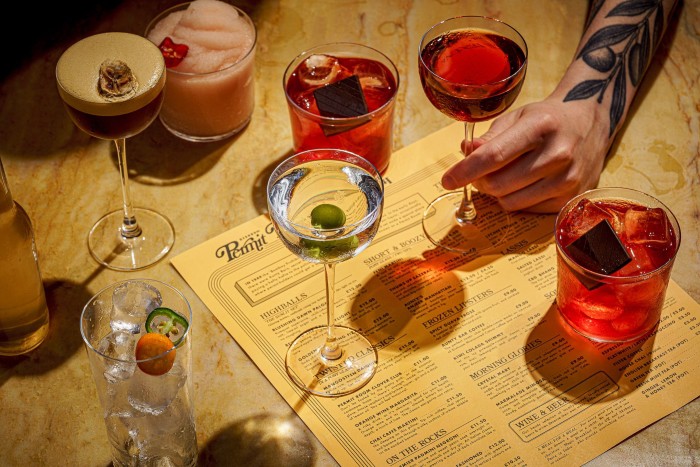
Dishoom will open a standalone all-day bar in Brighton this November. Oli Dodd chats exclusively with the restaurant group’s co-founder Shamil Thakrar and managing director Brian Trollip about the new opening.
“We've been dreaming about opening a bar for 10 years and we've never been successful,” explains Thakrar from Dishoom’s Shoreditch head office, just two months ahead of the launch of their most ambitious standalone bar concept to date.
“We did a pop-up at Southbank about a year into our restaurant career. We came up with this Chowpatty Beach Bar concept, and it was really good fun, it was very silly, it was packed, and to be honest it got us out of trouble in our first year of operation. But I don’t think people thought it was a bar, people thought it was food. And that’s been a problem. Later on, we opened a really cracking bar in Shoreditch, but it's always overwhelmed by people wanting to come to Dishoom for food. The same thing happened when we opened a bar downstairs in Kings Cross.”
The new bar The Permit Room, looks to change this trend. There will be a food menu, but the cocktails are intended to be the stars of the show.
“Dishoom, the food is clearly centre stage, here the drinks are centre stage and the food works around the drinks. We’ve kept it at really good value so it's very accessible. And it's a place where I think you don't have to commit, you can come in and have great cocktails and a food menu which is really dedicated to being drinking food.”
And that idea of a non-committal space is important to the concept of The Permit Room which aims to open early and transform throughout the day.
“Cities like Austin you get these lovely all-day spaces where you go for one thing and then be there many hours later than you anticipated being there,” says Trollip “The spaces lend themselves to being guest-led. Particularly post-pandemic there seems to be so many more rules that bars and restaurants place on their guests, you can do these but I need you out by this time, and that seems to work really hard against what we think hospitality is.
“In Dishoom we’ve made incremental gains every single day over 13 years it works like a really well-oiled machine that’s curated from start to finish. This is intentionally slightly chaotic so we can respond to what our guests tell us we should be doing.”
The bar itself will pay homage to the permit rooms of post-prohibition Bombay, which in 1970s became the city’s only legal outlet for the consumption of alcohol.
“The Permit Room really is a celebration of how Bombay gets shitfaced,” explains Thakrar. ”Bombay has a really interesting history of its relationship with alcohol. In 1948, everyone was taken with Gandhi, who for all his virtues and lovely non-violence was also a complete prude and hated drinking. The central government made some changes in legislation which made it easier for states to ban alcohol and there's a guy called Morarji Desai, who was the chief minister of Maharashtra state after independence, used that to ban alcohol so the whole of Bombay became dry.
“Later on they did liberalise it, in the late 70s they introduced permits for drinking and you’d then go to these permit rooms. They became a way for cafes that weren't necessarily making that much money to get a beer permit, and to get a hard liquor permit and become a permit room. And some of them went on to become beer bars and do essentially prostitution. There’s a quirkiness in the way you're served and the food traditions. So really, what we're doing is having fun with all of that, and taking all those great stories and, experiences we've had from drinking in Bombay for decades.”
The drinks list, developed by Dishoom’s head of bar development, Laura Simonelli, and bar ops manager Jake Odlum, also pays tribute to that history but with an emphasis on approachability rather than being tied to a theme. There’s a Mango Lassi Punch, but clarified with yoghurt, it feels refined, and the addition of Feni, an Indian moonshine, in the Martini lends a fruity earthiness, like blanche Armagnac.
“We’re inspired by the ingredients, not confined by them,” explains Odlum. “We didn’t want to lean heavily on those flavours and use jaggery or something in a drink for no reason.
“All the cocktails are pre-batched and made in one location. The reason is consistency but also speed of service. If the bartender doesn’t have to spend so much time making the drinks, they can focus more on the guest experience.”
Whether the Permit Room becomes another Dishoom venue where guests visit to eat rather than drink will be answered when the doors open in November, but avoiding that possibility is one of the reasons why Brighton makes so much sense to the team.
“I think the trick with a bar is to open it not next to a Dishoom,” says Thakrar. “It has to feel separate, so we thought, let’s not do it even in London, and Brighton seems like a really great spot. Brighton’s a great place to do those collaborations because it’s got a thriving independent scene and it just feels like a place that when we envisaged the bar that we wanted to hang out in. The bar and the city seem to fit each other really well.”


